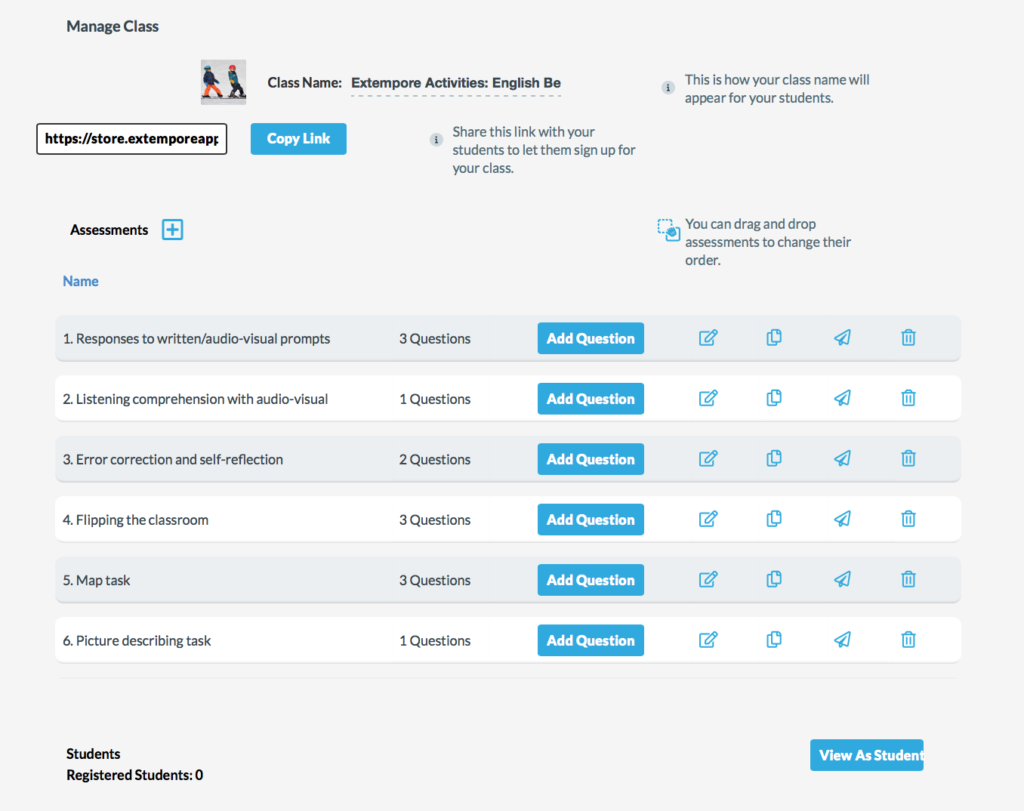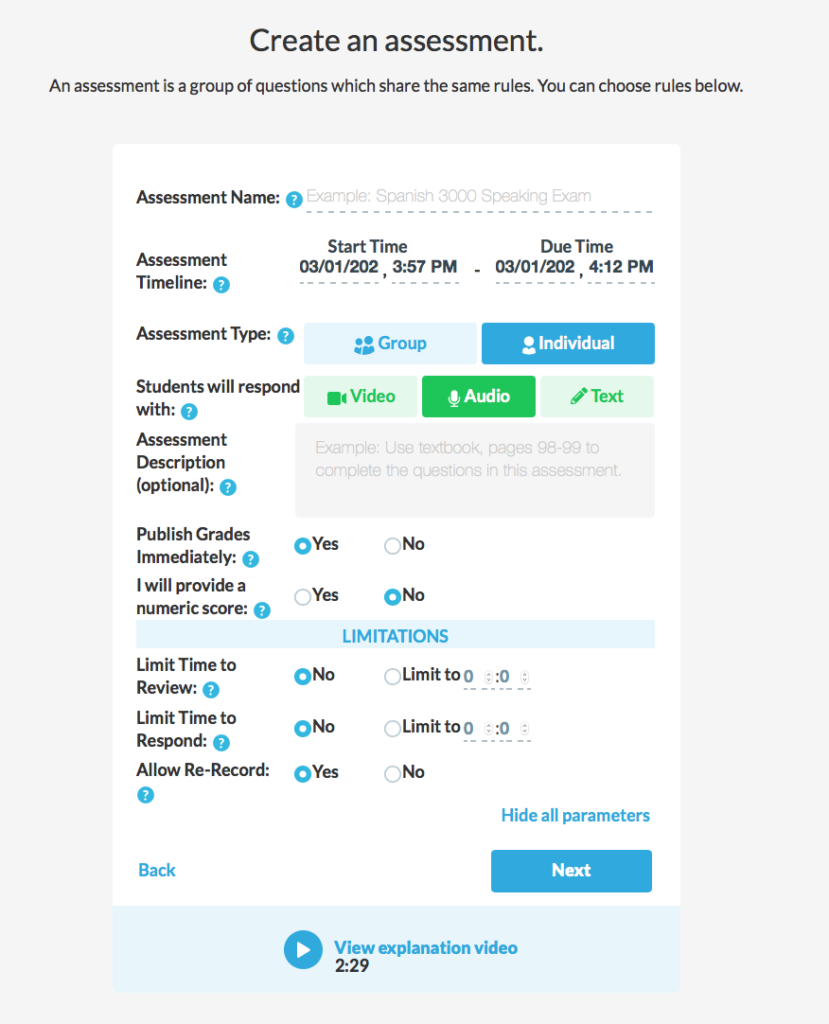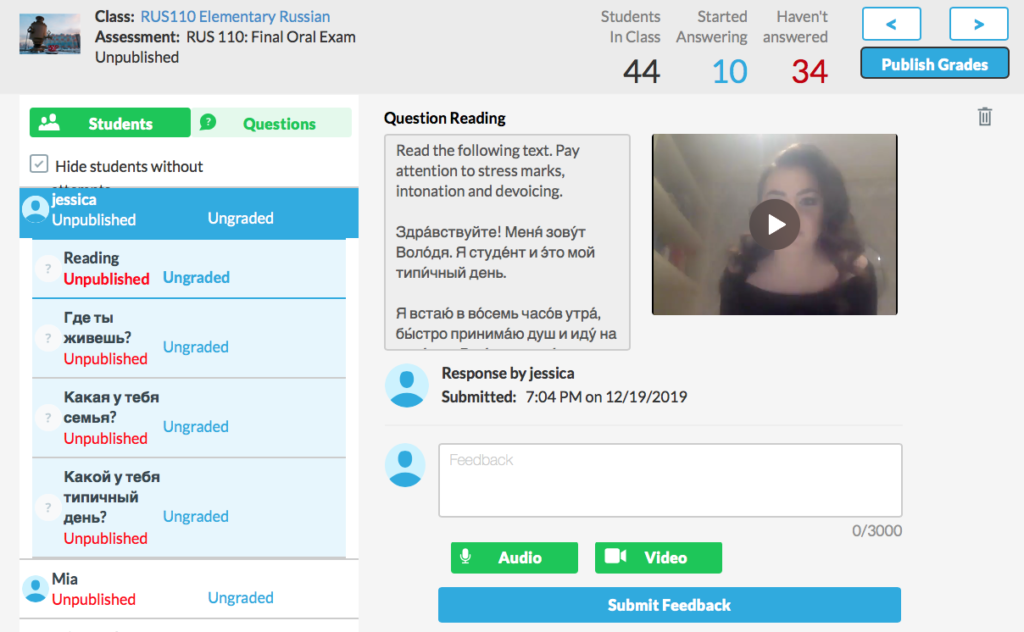Extempore: A Speaking Practice App
 By Irina Kogel, Five College Lecturer in Russian at Mount Holyoke College, the University of Massachusetts Amherst and Smith College.
By Irina Kogel, Five College Lecturer in Russian at Mount Holyoke College, the University of Massachusetts Amherst and Smith College.
Extempore is a web-based platform designed to let language teachers assign and grade oral assessments. The app allows for the creation of assignments, houses student responses, and provides a portal for teachers to provide feedback. For me, Extempore’s chief advantages are how well it streamlines the oral exam and feedback process, especially in the context of larger classes, and its potential to reduce student anxiety around oral assessments.
| Name | Extempore, The Speaking Practice App |
| Link | extemporeapp.com |
| Primary Purpose | Online oral assessment platform |
| Cost | Institution and student-paid licenses; student-paid licenses are $9.99/student per class and institutional licenses start at $8.99/student per class with discounts depending on the number of students; free demo with full functionality that can be converted to a paid account |
| Ease of Use | 5/5; easy to use how-to videos and activities manuals; option to schedule video conferencing and training sessions with sales representative |
The focus of Extempore is on the production and recording of speech, and on providing teachers with the best tools to provide student feedback. It is not as visually arresting as some similar apps on the market, but is very straightforward to use for both instructors and students.

When you are getting started, it is particularly helpful to download one of the existing class activities sets to get a sense for the functionality of the app. As you can see from some of the sample ESL assessments above, prompts can be assigned using video, audio, and static images. Extempore can also house flipped classroom assignments and record student answers to comprehension checks. Extempore also currently has two activities handbooks in PDF format with suggested assessments. One of the co-founders of the app is a professor of Spanish linguistics at the University of St. Thomas in Minnesota. Evidence that language instructors were involved in the creation of Extempore can be found throughout the how-to guides and sample assessments via helpful notes on the theoretical SLA underpinnings of the suggested activities.

Once you have set up an account, you can create an assessment very easily.
First, set up a class for your assessments to go into—students will then be able to access all their assignments for a given class via a single link. Each time you create an assignment you have to determine whether it will be conducted individually or in groups. Then you decide whether students will respond with audio, video or text. There are also grading options, but it is possible to provide written and oral feedback without assigning a numerical grade within Extempore as well. Finally, you must choose whether students can re-record their responses or if they will be limited in the time they have to preview and record their answers. The time-limited feature is an interesting option, because it allows you to create an assessment where students respond to a series of questions almost as they would in a conversation. It is not currently possible to mix timed and untimed questions within a single assessment, but you could break up a single assignment across several assessments. I have found that students prefer the untimed questions and that the ability to re-record reduces their anxiety about taking an oral exam, but both types of assignments have their benefits.

Once students have completed the assessment, you can access their recordings in the gradebook. This is where Extempore really shines, because you can organize your grading by question or by individual student and submit your feedback in a number of different ways. Extempore’s most useful feature is that it allows you to interject recorded audio feedback interspersed with the student’s own recording, as well as to leave independent written, audio and video feedback (which has the potential to be used in a sign language context as well).
One comment I often get from students is that they wish they had more frequent, but lower stakes oral assessments. A platform like Extempore begins to make this possible, even in larger classes, by streamlining the process of conducting and grading oral assessments. With these capabilities, Extempore represents an important contribution to the market of online oral assessment products.

